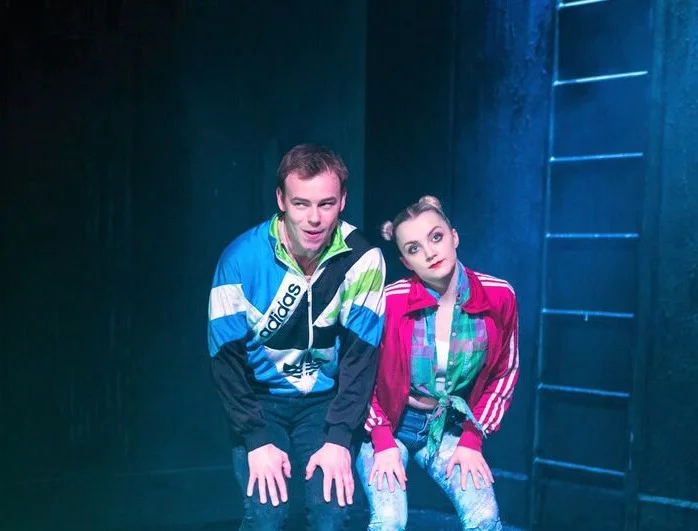Disco is one of those words that the senses respond to instantly with several very particular references: late 1960s or early ’70s New York City spring to mind. However, the world of Disco Pigs is a far cry from that, and disco assumptions are turned on their head. Enda Walsh’s play strips the term bare of its bright-lights, big-city ballroom connotations, throws a hefty dose of punk into the trunk, then turns off-road onto the aimless side of life. But it does so with deep, dark humor, wide-eyed invention and heaps of passion.
Evanna Lynch plays Runt and Colin Campbell plays Pig watching Baywatch in Disco Pigs. Top: Campbell, left, and Lynch in Enda Walsh’s play.
The opening scene is at once visceral, raw, intriguing, and unclear, as two talking heads, one male, one female, appear through cracks in the curtains. They are Darren and Sinead, better known, respectively, as Pig and Runt, who are vociferously “born” onto the stage. “’Da two mams squealing on da trollies dat go speeding down da ward. Out da fookin way!”
Born at the same time on the same day in the same hospital, Pig and Runt have been inseparable ever since. They speak in their own language, play by their own rules, and create a world for themselves in which boundaries blur between truth and illusion. Until, on their 17th birthday, they discover something more. As night falls, and the disco and drink take hold, they spiral violently out of control.
When audiences in Ireland first experienced Walsh’s Disco Pigs—set in County Cork, Ireland, in 1996—it was their “present day,” and it was on familiar terrain. John Haidar’s 20th-anniversary production of the play takes several leaps of faith in transporting New York audiences to a time and place which may feel very foreign.
Campbell and Walsh in a frenzied moment. Photographs by Jeremy Daniel.
The first leap for audiences on this side of the pond is accepting that, for all they know and love about Ireland, the world Pig and Runt inhabit is not the green and pleasant land depicted in tourist brochures. Walsh presents the underbelly of youth culture in Ireland at the end of the 20th century in frenetic, bipolar fashion.
Second is a title with the word disco in it: rural Ireland in the late 1990s is not where one would expect to go to disco. Third, and perhaps most critical, is the challenge of understanding the dialogue, which is thick and rich and hilarious, provided you can follow it. It’s a mixture of County Cork dialect with an exclusive, made-up language that metaphorically sets Pig and Runt apart from everyone else. "Wid dat da doors a da pub flap op an close as da Sinn Fein army pile-in an gadder bout da stout taps! Five hundred a da bas-turds all in nees of a good shave an da girlfrens like cocker spaniels come in oudda da rain! Da place go crazy!!"
The play moves with raging grace across and around a very bare stage like a dance (the movement director is Naomi Said). Elliot Griggs’s lighting not only fills up the starkness, it throws off a kaleidoscope of comic-colored hues, as do the performances. Colin Campbell’s energetic Pig is entertaining; his pathetic Pig is painful. His frenzied, alcohol-fueled moves on the dance floor and his sweet, sweaty-slow telling of his and Runt’s first sexual encounter offer a taste of the hard and soft shell of this young man.
Evanna Lynch’s Runt beams bright through the Disco Pig darkness. Through her reckless innocence are subtle expressions of someone who knows more than even she herself realizes. (Both actors are making their U.S. stage debuts.) Playwright Walsh’s script displays a master wordsmith at work. There is nary a pause in his lyrically discordant dialogue, which keeps this 75-minute piece moving at a clip, but when there is, like when the two settle down on the floor, Pig on top of Runt, to watch Baywatch on a very small, battered old TV, it is potent, poignant and necessary.
The Irish Rep’s Disco Pigs plays through Feb. 18 at the company’s home, 132 W. 22 St. Evening performances are at 7 p.m. Tuesday and Thursday and at 8 p.m. Wednesday, Friday and Saturday. Matinees are at 3 p.m. Wednesday, Saturday and Sunday. For tickets, call OvationTix at (212) 727-2737 or visit irishrep.org.





